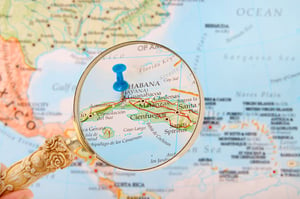Ferry Services, A New Way to Travel to Cuba
 Earlier this year, the United States loosened travel regulations for Americans visiting Cuba. The new rules make it possible for virtually anyone who wishes to visit the island to do so, and for excursion operators this is big news. The island, located just 90 nautical miles from the states used to be the number one international destination in the late 1950s. And according to Bruce Nierenberg, Chairman and CEO of United Caribbean Lines (UCL)— the new rules are transforming the way their company will offer travel to Cuba.
Earlier this year, the United States loosened travel regulations for Americans visiting Cuba. The new rules make it possible for virtually anyone who wishes to visit the island to do so, and for excursion operators this is big news. The island, located just 90 nautical miles from the states used to be the number one international destination in the late 1950s. And according to Bruce Nierenberg, Chairman and CEO of United Caribbean Lines (UCL)— the new rules are transforming the way their company will offer travel to Cuba.
For more than half a century, Americans have been barred from traveling to Cuba, Caribbean’s largest island. But now that America’s policy with the communist-run island has changed, UCL is making some changes themselves.
The company is creating a passenger ferry service between the countries. As Nierenberg said, “you can go to the airport and stand in line for several hours and get abused or you can drive your car onto our ferry service and we will hand you a Mojito.”
Here’s What You Need to Know:
What services does UCL plan to offer?
UCL will have large 2,000-passenger ferries that will offer similar accommodations to those available on a short overnight cruise. The journey will be an overnight trip with more than 400 cabins and full onboard service with dining and entertainment for passengers of all ages.
Where will the ferry's homeport be?
The cruise lines will use PortMiami and Port Tampa Bay as their homeports. These areas make the most sense as both locations have a significant population of Cuban Americans. UCL is working with both ports to set up the needed operational, customs, immigration, agriculture, and security facilities — all things required by both the US and Cuban governments.
What this means for excursion operators?
Considering that passengers will be traveling with their cars and staying onshore, this ferry operation will be bringing much more involved travelers. Excursion operators will have a chance to tap into that new market of adventure seekers, and UCL is putting in a concerted effort to make this successful. By working with Havana-based tourism organizations, UCL will offer onboard lectures given by travel experts as a way to best prepare passengers for their first visit to Cuba.
Nierenberg shared that more than 25% of travelers prefer not to fly from the US to Cuba. Having a ferry service will allow a new, more practical, and cost-effective mode of transportation to the island. He expects the service to save 25-50% off the cost of air travel and passengers will be able to carry up to 1,000 lbs. of approved humanitarian goods for a third of the costs of excess baggage on airplanes. The CEO is confident that with these benefits, and the fact that Americans have not been able to travel to the island since the Cuban revolution, the ferry service will be a very successful operation.

